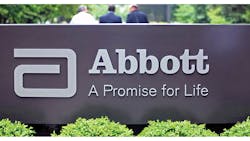Abbott Laboratories (IW 1000/56) agreed to buy heart-device maker St. Jude Medical Inc. for $25 billion, its biggest ever acquisition as the industry consolidates to gain bargaining power with hospitals.
St. Jude shareholders will receive $46.75 in cash and 0.8708 shares of Abbott common stock, representing approximately $85 per share. That’s 37% above St. Jude’s closing price on April 27. Abbott will also assume or refinance St. Jude’s $5.7 billion in debt.
Medical-devices makers are merging to get access to new technology as hospitals push for lower prices. After shying away from mega deals since spinning off its brand name drug business as AbbVie Inc. in 2013, Abbott is now joining Medtronic Plc and Johnson & Johnson, which both made their largest purchases in recent years. Abbott Chief Executive Officer Miles White talked often about his desire for bigger deals while pursuing smaller companies, although the recent rounds of M&A lifted the prices of potential targets, leaving fewer options.
Abbott, an industry leader in heart stents, has been bulking up its generic-drugs business in emerging markets and nutrition products sold directly to consumers in recent years. With St. Jude, it’s gaining complementary products like pacemakers, heart valves and devices to treat atrial fibrillation. There is an obvious hole in the medical device business, specifically around cardiovascular products, and St. Jude is the perfect fit to fill that gap, according to Jonathan Palmer, a Bloomberg Intelligence analyst.
“In an industry where a larger portfolio is increasingly important, Abbott just built a real medtech franchise,” said Joanne Wuensch, an analyst at BMO Capital Markets Corp. who rates the stock outperform, in a note to investors. “From our perspective, there is very little, if any, product overlap, but a real opportunity for cross-selling.”
Alere Deal
The agreement is raising further questions about Abbott’s planned acquisition of Alere Inc. for $5.8 billion. Abbott said in the statement it has financing for both St. Jude and Alere. That initially sent Alere shares higher in early trading, but the stock pared gains after Abbott CEO White said on a conference call his company has financing, “broadly,” for Alere, declining to comment further. Last week, White had declined to reiterate his commitment to Alere, which hasn’t yet filed its 10-K report with U.S. regulators and has been subpoenaed by the Justice Department.
The acquisition will further reshape Abbott following the 2013 split with AbbVie. The company, based in Abbott Park, Illinois, has cash on hand, obtained by selling its generic drugs business for medicines marketed in Europe and the developed world to Mylan NV.
St. Jude will add 21 cents to Abbott’s adjusted earnings per share in 2017, the first full year after the close, and 29 cents in 2018. The two companies, which have been selling some products jointly as part of an alliance since 2008, plan to cut $500 million in costs annually from the combined operation by 2020.
Last August, Abbott denied a report that it was preparing an offer for St. Jude Medical. Since then, St. Jude’s stock had dropped 19% through Wednesday, more than the 1.1% decline in the Standard & Poor’s 500 Health Care Sector Index and Abbott’s drop of 4%.
Abbott started talking to St. Jude at the end of last year, CEO White.
Abbott has a track record of generating solid profits in mature markets that other companies have overlooked or exited, including generic drugs and diagnostic tests. White described areas like heart rhythm management as “stable, well established and even mature” and said he welcomed their “rock solid” contributions and potential for incremental innovation and growth.
“When you put all that together, it’s the combined representation of that breadth of products that makes the combined company so much more competitive,” he said on the conference call.
The deal has challenges for Abbott, said Michael Weinstein, an analyst at JPMorgan Chase & Co in New York, in a note to investors.
“Strategically, investors are likely to frown on the transaction, given the shift in Abbott’s mix away from consumer-facing, emerging-markets strategy it has been building in recent years and (2) St. Jude’s challenges in cardiac rhythm management and repeated stumbles in executing on its pipeline,” he wrote in his note. “Financially, however, we expect the transaction to be well received.”
Abbott used Evercore as its lead financial adviser; Wachtell Lipton, Rosen & Katz for its legal counsel and BofA Merrill Lynch for financing and as a financial adviser. Guggenheim Securities advised St. Jude, and Gibson, Dunn & Crutcher LLP provided legal counsel.
About the Author
Bloomberg
Licensed content from Bloomberg, copyright 2016.
